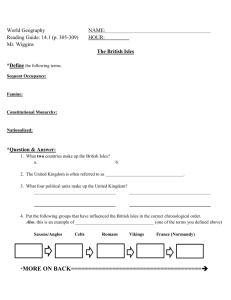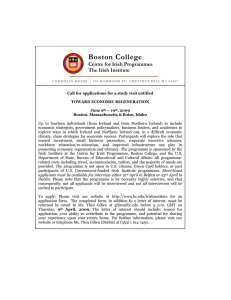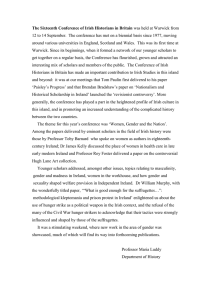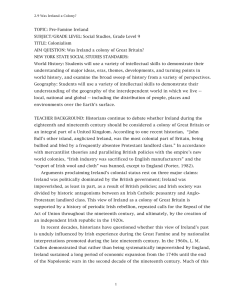What is a colony?
advertisement
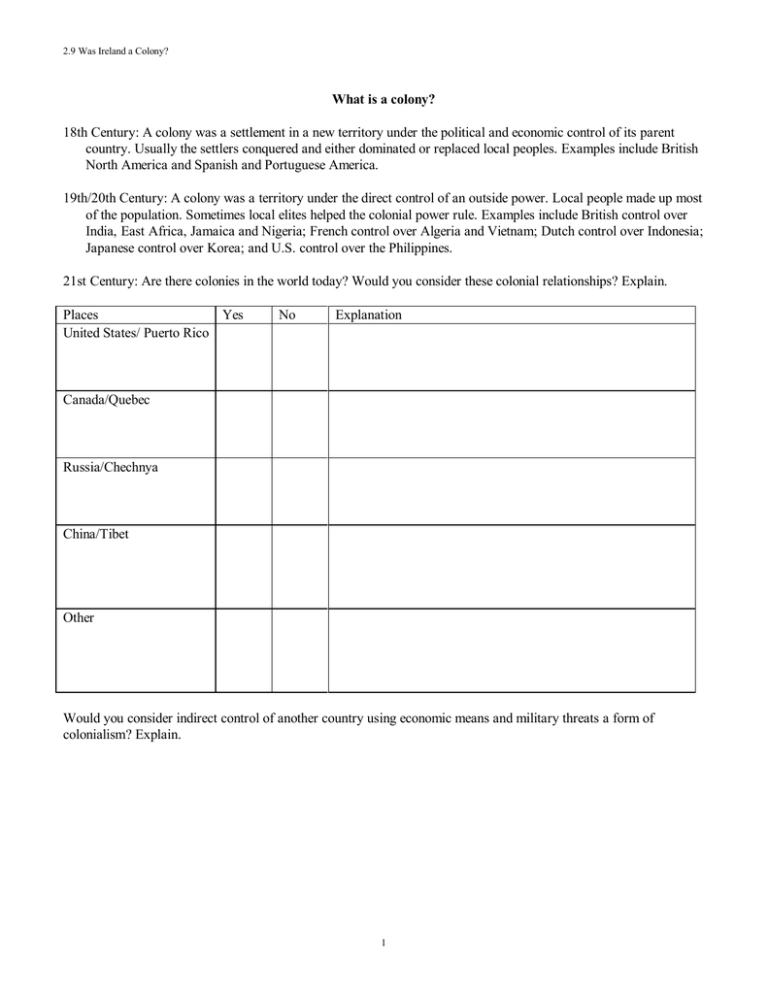
2.9 Was Ireland a Colony? What is a colony? 18th Century: A colony was a settlement in a new territory under the political and economic control of its parent country. Usually the settlers conquered and either dominated or replaced local peoples. Examples include British North America and Spanish and Portuguese America. 19th/20th Century: A colony was a territory under the direct control of an outside power. Local people made up most of the population. Sometimes local elites helped the colonial power rule. Examples include British control over India, East Africa, Jamaica and Nigeria; French control over Algeria and Vietnam; Dutch control over Indonesia; Japanese control over Korea; and U.S. control over the Philippines. 21st Century: Are there colonies in the world today? Would you consider these colonial relationships? Explain. Places Yes United States/ Puerto Rico No Explanation Canada/Quebec Russia/Chechnya China/Tibet Other Would you consider indirect control of another country using economic means and military threats a form of colonialism? Explain. 1 2.9 Was Ireland a Colony? Why did British colonies in North America declare Independence during the Age of Revolution (1765-1820)? Read each passage. 1- Identify the main idea of each passage. 2- Explain how the author provides support for American independence. Benjamin Franklin (Testimony before the British House of Commons on the American Stamp Act, 1766): “(B)y the same charter, and otherwise, they (the American colonists) are entitled to all the privileges and liberties of Englishmen; they find in the Great Charters, and the Petition and Declaration of Rights, that one of the privileges of English subjects is, that they are not to be taxed but by their common consent; they have therefore relied upon it, from the first settlement of the province, that the Parliament never would, nor could, by color of that clause in the charter, assume a right of taxing them, till it had qualified itself to exercise such right, by admitting representatives from the people to be taxed. . . ‘The common rights of Englishmen,’ as declared by Magna Charta, and the Petition of Rights, all justify it.” Thomas Paine (Common Sense, 1776): “But Britain is the parent country, say some. Then the more ashame upon her conduct. Even brutes do not devour their young, nor savages make war on their families. . . This new world hath been the asylum for the persecuted lovers of civil and religious liberty from every part of Europe. Hither have they fled, not from the tender embraces of the mother, but from the cruelty of the monster; and it is so far true of England, that the same tyranny which drove the first emigrants from home, pursues their descendants still.” Thomas Jefferson et al (Declaration of Independence, 1776): “We hold these truths to be self-evident, that all men are created equal, that they are endowed by their Creator, with certain unalienable rights, that among these are life, liberty, and the pursuit of happiness. That to secure these rights, governments are instituted among men, deriving their just powers from the consent of the governed. That whenever any form of government becomes destructive of these ends, it is the right of the people to alter or to abolish it. . .The history of the present King of Great Britain is a history of repeated injuries and usurpations, all having in direct object the establishment of an absolute tyranny over these States.” 2 2.9 Was Ireland a Colony? Ireland in the Age of Revolution (1765-1820) Read the introduction and each passage. 1- Identify the main idea of each passage. 2- Explain whether the author provides support for Irish independence. 3- How are these statements similar to or different from American calls for independence? 4- Based on discussions in class and these passages, explain whether you would have supported Irish independence during the Age of Revolution if you were: (a) An Irish Catholic tenant farmer; (b) An Anglo-Irish Protestant professional or landlord; (c) A member of the Irish Catholic urban middle class; (d) An English businessman or meber of Parliament. The first three passages are by leaders of the struggle for greater rights for the Irish. Jonathan Swift was a noted author who wrote at the beginning of the 18th century. When he wrote, Ireland had its own Parliament. His demand is for the same rights as Englishmen. Wolfe Tone and Leonard McNally were leaders of the United Irishmen at the end of the 18th century. They demanded independence for Ireland. Lord Clare was a leading advocate of formal union between Ireland and England in the United Kingdom under one Parliament and King. Clare warns that the Irish elite should consider what would happen if Ireland became independent. Clare uses the term colony in the 18th century form referring to English settlers in Ireland. Jonathan Swift: “Were not the people of Ireland born as free as those of England? Is not their Parliament as fair and as representative of the people as that of England? Are they subjects of the same King? Does not the same sun shine on them? And have they not the same God for their protector? Am I a free man in England, and do I become a slave in six hours by crossing the Channel?” Wolfe Tone: “To subvert the tyranny of our execrable government, to break the connection with England, the never failing source of all our political evils and to assert the independence of my country -- these were my objects. To unite the whole people of Ireland, to abolish the memory of all past dissensions, and to substitute the common name of Irishman in place of the denominations of Protestant, Catholic and Dissenter - these were my means.” Leonard McNally: “The whole body of the peasantry would join the French in case of an invasion. . . The suffering of the common people from high rents and low wages, from oppressions of their landlords . . . and tithes are not the only causes of disaffection to Government and hatred of England; for though these have long kept the Irish peasant in a state of slavery and indigence, yet another cause, more dangerous, pervaded them all. . . This cause is an attachment to French principles in politics and religion, and an ardent desire for a republican government.” Lord Clare: “The whole power and property has been conferred by successive monarchs of England upon an English colony composed of three sorts of English adventurers who poured into this country at the termination of three successive rebellions. Confiscation is their common title and from their first settlement they have been hemmed in on every side by the old inhabitants of the island, brooding over their discontents in sullen indignation. What was the security of the English settlers for their physical existence? And what is the security of their descendants at this day? The powerful and commanding position of Great Britain. If by any fatality, it fails, you are at the mercy of the old inhabitants of this island, and I should have hoped that the examples of mercy exhibited by them in the late rebellion would have taught the gentlemen who call themselves the Irish nation to reflect with sober attention on the dangers which surround them.” 3





